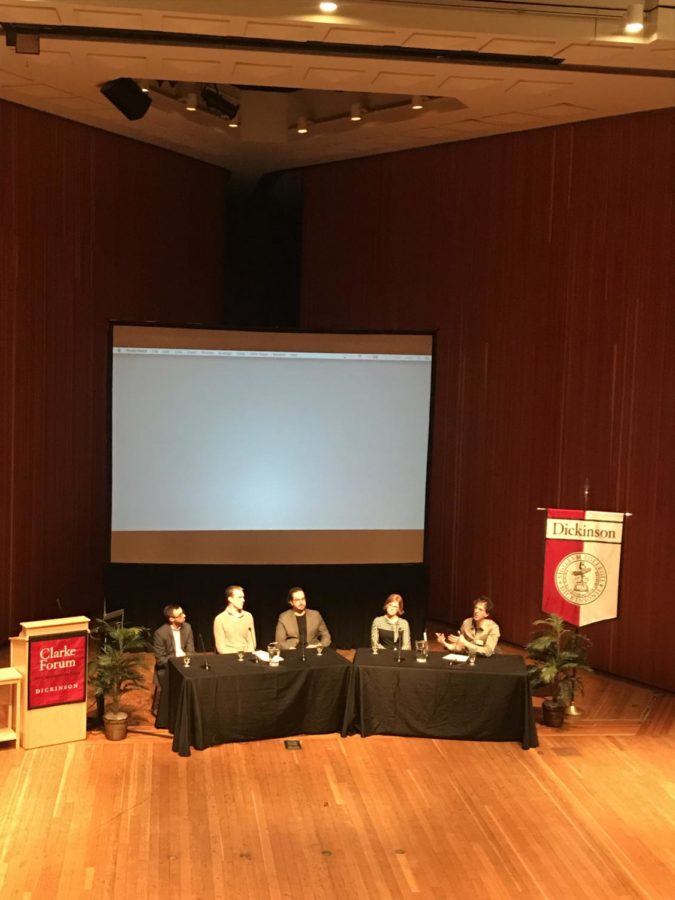Panelists Claim Benefits of VR Outweigh Harms
A panel of experts discussed new developments in computer-generated virtual reality (VR) and the politics of media production and consumption, leaving several attendees thinking a range thoughts, from “pessimistic” to “scared” to “excited.”
The panel consisted of Eitan Grinspun, associate professor of computer science and applied mathematics at Columbia University; Tabitha Peck, assistant professor of mathematics and computer science at Davidson College; Graham Roberts, director of immersive platforms storytelling at The New York Times; and Steven Malcic, visiting professor of film and media studies in the department of English at Dickinson College. Gregory Steirer, assistant professor of English and film studies, moderated the discussion on virtual reality and the possibilities, politics and dangers of these developments in computer generated technology.
Noah Fusco ’18 “was really struck at both the practical considerations of panelists as well as imaginative and optimistic ones. I thought about this but I was a little pessimistic about it because I sort of worried about the force of capitalism and money will sort of taking over, however, we choose to use [VR]… how much is what we see going to be dictated by questions of what would make the most money and how can we monetize it… The most rewarding thing for me tonight was both recognition of the pitfalls of this but also some of the more positive things.”
“I thought it was very eye opening,” said Linh Nguyen ’20. “I’m both excited about new technologies but scared that we have not talked about the ethics surrounding these VR technologies enough.”
Sara Duane ’20, on the other hand, focused more on the value of technology. “Because they came from different fields,” she said, focusing on the merit of the discussion, “the panelists were each able to provide unique perspectives on the implications of new technologies, such as virtual reality, on society. The conversation was exciting, as the panelists discussed technologies they have created or are working on and we also got to hear other panelists’ interpretations of how these new technologies might alter what we see in the media.”
Grinspun introduced himself and his research, which focuses on the engineering side of technology. He explained how engineers could identify physical laws and use computer tools to achieve specific objectives in computer-generated VR, a technology that is used in the entertainment industry. For example, animation producers use this technology to show how characters’ hair moves to reflect their personalities. This technology can also be used in the fashion industry, where designers can visualize the size and actual fitting of the clothing on people.
Peck, on the other hand, has experience in a VR lab and discussed possible applications of VR. She emphasized the importance of “vision” in VR, stating that vision affects people’s behavior because the body reacts to what one sees. The immersive and realistic vision VR provides can be harnessed by researchers and can further affect people’s perceptions.
Roberts built upon the revolutions VR brings to the media industry. He also defined the term “augmenting reality” (AR), which helps journalists to create compelling and necessary story-telling tools. AR enables readers to have immersive experiences of certain news events. He then introduced NYT VR, a VR app available in the App Store and Android which “takes” The New York Times’ readers to cultures, conflicts and sports.
Malcic provided his viewpoints on the current digital era. He questioned the credibility of the information available online because companies can easily manipulate the information to fit certain agenda for lucrative purposes.
All of the panelists agreed upon the positive contribution of VR and other new technologies.
Roberts, from a media professional’s perspective, stated that VR helps increase media transparency. With news delivered by VR, readers are presented with a holistic scene and are able to foster their own perspectives. He also claimed that the 3D environment will be the most efficient way to deliver information.
Peck noted that VR could be used not only in the entertainment industry, but also be of personal use: for introverts to practice public speaking, for nurses to train in caring for children or for pilots to train flying in various conditions.
Some students raised concerns about the potential abusive use of VR as Peck mentioned her researches were mainly funded by the military in the European Union. However, Peck then claimed that the VR research programs are specifically designed for scientific use. She explained that she was more concerned about VR apps available to the public but not yet thoroughly tested by researchers.
More than 100 audience members attended the event, including students, faculty and Carlisle community members, which took place on Tuesday, April 3.





